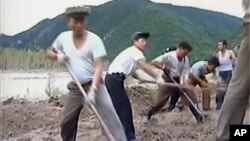Food aid has reached more than 140,000 people hit by recent floods in North Korea, but more is needed to help them through the country's upcoming severe winter, the U.N. World Food Program (WFP) said on Tuesday.
The floods in the country's north were caused by heavy rainfall in late August and early September.
More than 140,000 were affected, but this number is likely to rise as more of the affected areas are accessed, WFP said. Flood-hit families urgently need shelter, clean water and health care, as well as food, the U.N. agency said.
"Whole villages have been washed away by flash floods. Families have lost everything, including their kitchen gardens and livestock, which many households depend upon to supplement their diets," Darlene Tymo, WFP's representative and country director in North Korea, said in a statement.
"The floods came just before the harvest period, when the crops were still in the ground," Tymo added.
More than 70 percent of the country's population experiences food shortages, with many lacking essential proteins, fats, vitamins and minerals, WFP said.
Flood-hit provinces North Hamgyong and Ryanggang have the worst levels of hunger in the country, the agency said. WFP said the families will need help through the winter when temperatures can plunge to below minus 25 degrees Celsius (minus 13 degrees Fahrenheit).
"These families need continued support to get through the worst of the winter," Tymo said.
More than 35,500 homes had been damaged, two-thirds of them completely destroyed, and 107,000 people had been displaced by the floods, the U.N. Office for the Coordination of Humanitarian Affairs (OCHA) said on Monday.
Some 133 people were killed and 395 are missing, OCHA said. The agency said these figures were based on government data. North Korea's state media reported heavy rain in late August and early September caused extensive damage near the Tumen river. It did not give a death toll from the flooding in its latest report.
The North's KCNA news agency said on Sunday the worst "climatic phenomenon" in more than 70 years hit the northern part of the country causing "huge losses," and recovery work was under way.
Widespread deforestation for fuel and farming makes the impoverished state prone to natural disasters, especially floods.





